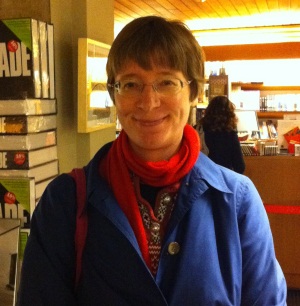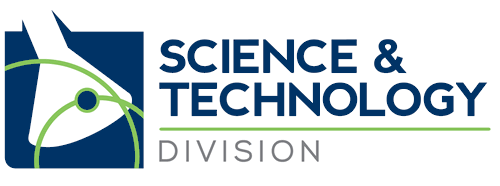We are excited to welcome our new blog editor, Naomi Sutcliffe de Moraes. As you will see below, Naomi’s education and experience span an impressive range of fields—we hope that you find her career thus far as fascinating as we have. If you would like to support Naomi as assistant editor or contribute to the STD blog, please write to us at divisionS_TD@atanet.org.
Naomi, it seems that many scientific and technical translators take a roundabout path in their careers. Is that true for you? Tell us about how you became a translator with your specialization.
 My career has definitely been roundabout! I got a BS in Mechanical Engineering because I wanted to understand how things work. Nearing the end of my degree, I became more interested in why things work the way the work, and did an MS in Physics. I then got a job in the defense industry in Los Angeles, as a software engineer and systems engineer on large radar projects. I loved my job, I loved my life… then I married the love of my life and we moved to Brazil. That was a huge shock. I was always in demand in the United States. I had headhunters trying to recruit me, a very large salary, and then in Brazil no one was interested. There was no defense industry in Brazil. I had been working with Unix systems, with C++ and other advanced languages. In Brazil, the companies hiring wanted people who were used to working with DOS, Basic and Pascal. I kid you not… That was a while ago, but no one wanted that in the US. And Brazilian companies never want to train anyone. They expect you to learn on your own, by taking courses, and arrive fully trained.
My career has definitely been roundabout! I got a BS in Mechanical Engineering because I wanted to understand how things work. Nearing the end of my degree, I became more interested in why things work the way the work, and did an MS in Physics. I then got a job in the defense industry in Los Angeles, as a software engineer and systems engineer on large radar projects. I loved my job, I loved my life… then I married the love of my life and we moved to Brazil. That was a huge shock. I was always in demand in the United States. I had headhunters trying to recruit me, a very large salary, and then in Brazil no one was interested. There was no defense industry in Brazil. I had been working with Unix systems, with C++ and other advanced languages. In Brazil, the companies hiring wanted people who were used to working with DOS, Basic and Pascal. I kid you not… That was a while ago, but no one wanted that in the US. And Brazilian companies never want to train anyone. They expect you to learn on your own, by taking courses, and arrive fully trained.
I finally got a job in the R&D department of a company making routers. I was hired as a software engineer, but they asked me to first translate two manuals into English so that they could sell their products abroad. Then they had me write the next few manuals. They would give me a router, let me play with it and write the manual in both languages based on my experiments. Kind of fun, but not the best way to go about it. I started doing some freelance translation jobs, with no training, and decided I preferred to work at home, in my pajamas, without the 2 hour commute each day. I have been a freelancer or had my own company ever since.
Was it challenging for you to combine your scientific and linguistic interests? What advice would you give to translators or interpreters just starting their careers?
I would say that I mourned the loss of my prior career, working with numbers, coding, doing engineering things. I imagine it is a bit like studying for 8 years to become a musician, then never playing again. Doing academic research has allowed me to satisfy my scientific side. I took a two-year break (2016-2018) from translation to be a visiting professor at the Federal University of the ABC Region (UFABC) in Brazil. I loved teaching calculus! I loved seeing the lightbulbs lighting over students’ heads when I explained things. It was very rewarding, but I lost most of my translation clients because I was teaching full time and too exhausted in the evenings/weekends to translate. Oops!
What is unique about your skill set? What sets you apart?
I love love love LOVE to study and learn new things! When I started translating as part of my job, unexpectedly, I said to myself “I have no idea what I am doing” and I signed up for a respected two-year course for translators and interpreters in São Paulo. I then entered the PhD program at the University of São Paulo and got a PhD in Linguistics with a thesis on legal translation. Yes, legal translation. Despite my engineering and physics background, I received very few technical translations for the first 15 years of my career. This was because I translated Portuguese into English, and Brazil imports technology. The technical work (manuals, patents, etc.) was almost all into Portuguese. I was contacted more and more often for legal translation. It became my main specialty despite my lack of legal background, so I decided to study law so I would at least know what I was doing. Getting a law degree was a bit overkill, of course, but now I can translate legal documents quickly and accurately.
What is your favorite type of text to translate? What makes it fun for you?
Well, after getting tons of legal documents and spending several years of my life getting a law degree just to improve my translations, I then found a client who wanted regular science and engineering translations! I would do thousands of words every month, month after month. I was in heaven! Astrophysics, physics, math, computer science, engineering etc. I was then sort of kicking myself for spending all that time studying law… Unfortunately, that lasted only a few years because a recession hit Brazil. Most of my technical translations for Portuguese to English are academic articles now. Fortunately, I started translating Italian to English about 7 years ago and I do get engineering and science work in that language combination. Italy and Switzerland export a lot more technology than Brazil. Maybe I will add French in a few years!
Can you describe a project that you’re most proud of, or one that was particularly memorable?
When translating academic articles, working directly with the author, I get a lot of satisfaction in improving the article by teasing out what the author wanted to say (rather than what they wrote) and making the translated or edited article much clearer than before. This involves a lot of questions and answers back and forth, but the end result is gratifying.
After 20 years as a translator, I recently decided to start writing and translating my own texts, in a sort of transcreation process. I have a bilingual cooking and ecology blog called EcoVege (vege.eco.br and ecovege.net). I write a post or recipe in one language, then rewrite it with appropriate localization in the other language. Brazil and the US have different ecological issues, different foods available, and opposite seasons. I have tons of recipes that I have created over the years, and I like to create a new one once or twice a month. The physicist in me loves working with ingredients, measurements, and the chemical reactions that occur in cooking, especially baking. All my desserts are fruit-sweetened, which is very challenging.
Are there any resources you use when translating that you’d like to share with readers?
IATE is good for general, legal and scientific/engineering terms.
A resource I often use to find just the right word in context is synoniemen.net. The site is in Dutch, but it has many languages and the interface is simple. The Vertalingen tab provides translations. Choose the source and target languages (written in Dutch, sorry!) and click on the magnifying glass to search. It usually provides many more translation options than a normal bilingual dictionary, and often one of them is just what I wanted, on the tip of my tongue, but could not remember.
I cannot live without thesaurus.com. I always have it open, even when writing.
I often use the Corpus of Contemporary American English as a reference. My translation website has some information on how to use it, and why you might want to.
There is an online collocations dictionary for academic English at https://ozdic.com that can be very useful, especially when editing non-native English. It is great for when a preposition or other collocation sounds a little off, but you are not quite sure why.
I also use desktop search tools that allow you to index a specific folder (and its subfolders) and do searches just inside them. I index my past translations and all of my terminology files.
- Archivarius 3000 (PC)
- DocFetcher (Mac) – Unfortunately, it will not close on either of my Macs, so I always have to “kill” it through the Activity Monitor. But it is free so I am not complaining.
I also love the application Afred (Mac) because it allows you to search on file names, but also for files containing a specific text string inside, anywhere on your computer. I use it constantly.
How can readers learn more about you and connect with you?
My website for translation services is JustRightCommunications.com
My online academic english courses are at ResearchWrite.net
Facebook: https://www.facebook.com/naomi.moraes.3
LinkedIn: https://www.linkedin.com/in/naomi-sutcliffe-moraes/
Twitter: https://twitter.com/ndemoraes

